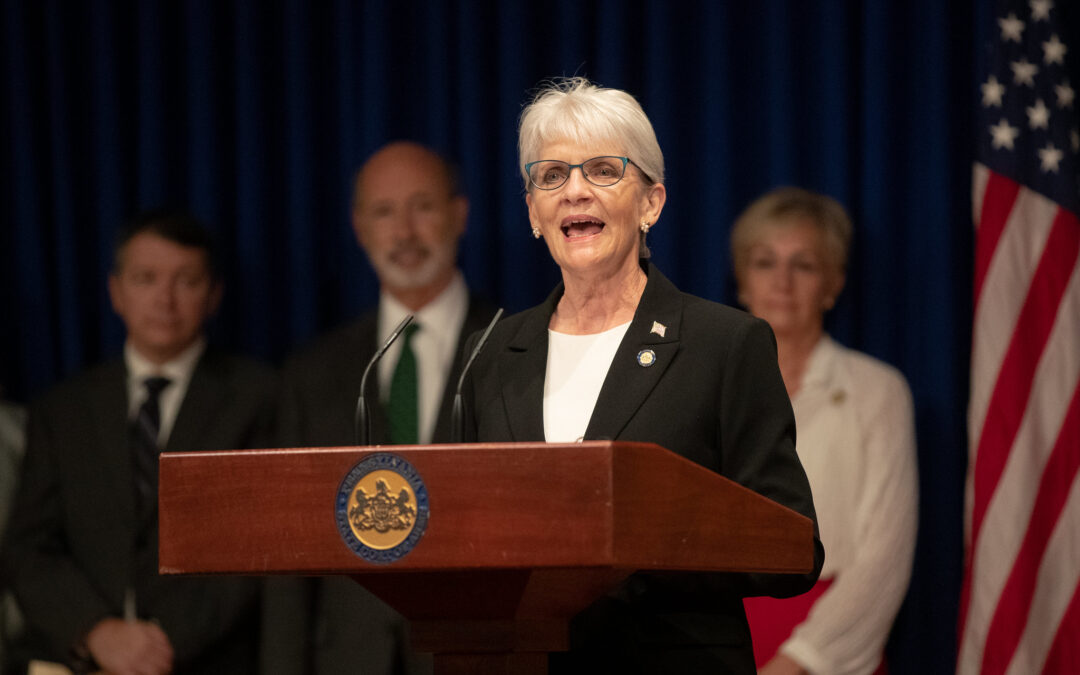HARRISBURG (June 14, 2021) – As Pennsylvania moves forward towards reducing harmful greenhouse gas emissions by participating in the Regional Greenhouse Gas Initiative (RGGI), Governor Tom Wolf today joined state Senator Carolyn Comitta and state Rep. Dianne Herrin, who are introducing legislation that would target funding from RGGI proceeds to communities impacted by climate change.
“Participating in RGGI will further our commonwealth’s climate goals, mitigate ongoing damage from climate change and invest in our workforce. Funds brought in through RGGI will allow us to make targeted investments to support workers and communities affected by energy transition, invest in environmental justice, and strengthen Pennsylvania’s clean energy, commercial and industrial sectors,” Gov. Wolf said. “I want to thank Senator Comitta and Representative Herrin for introducing legislation to make those investments a reality.”
The Pennsylvania Department of Environmental Protection (DEP), at the direction of the governor, is currently taking steps through the regulatory process to participate in RGGI, a market-based collaboration among nearly a dozen Northeast and Mid-Atlantic states to reduce greenhouse gas emissions and combat climate change while generating economic growth.
Participating states implement RGGI through a regional cap-and-invest program involving CO2 emitting electric power plants. In order to show compliance with the cap, power plants must purchase a credit or “allowance,” for each ton of CO2 they emit.
These purchases are made at quarterly auctions conducted by RGGI. The proceeds from the auctions are allocated back to the participating states in proportion to the amount of carbon subject to regulation in each state.
Senate Bill 15 and House Bill 1565 would create funds to disperse proceeds that would be generated for Pennsylvania through RGGI auctions. Specifically, it would make targeted investments to support workers and communities affected by energy transition, invest in environmental justice communities, and further strengthen Pennsylvania’s growing clean energy, commercial, and industrial sectors.
“RGGI and Senate Bill15, the RGGI Investments Act, will set us on a path towards a clean energy future in Pennsylvania,” said Comitta. “This legislation will ensure that our communities can transition to clean and renewable jobs, invest in energy efficient programs, and uplift the health and wellbeing of all Pennsylvanians. With the threat of the climate crisis, the time to act is now. It is our duty to create a safe and healthy future for all generations.”
“Just last week, we have seen a coal mine close and a coal-fired electric generating plant close in Western Pennsylvania, and it’s clearer than ever the energy industry is changing forever – not due to government regulation, but to simple economic realities,” said Rep. Herrin. “With this RGGI plan, mechanisms would be in place to support these hard workers and communities with worker training programs and economic development opportunities. Pennsylvania has always been a leader in energy, and it’s time we truly embrace the future and start doing the right thing for the health of our families, for job growth, and for protecting our air and water. Joining the Regional Greenhouse Gas Initiative is our best path forward with other mid-Atlantic states, while still putting our people and communities first.”
“RGGI participation will undoubtedly have tangible health, environmental and economic benefits for all of Pennsylvania overall,” said DEP Secretary Patrick McDonnell. “One highly anticipated benefit, though, is how this program will elevate and uplift our state’s most distressed communities by investing funding from RGGI proceeds into them.”
The RGGI states have reduced power sector CO2 pollution by 45 percent since 2005, while the region’s per-capita GDP has continued to grow.
Through its first six years of existence, RGGI investments were found to return $2.31 billion in lifetime energy bill savings to more than 161,000 households and 6,000 businesses that participated in programs funded by RGGI proceeds, and to 1.5 million households and over 37,000 businesses that received direct bill assistance.

